Understanding the Impact of Addiction on Families
Addiction does not only affect the person struggling with substance use; it permeates the entire family system, causing emotional trauma, eroding trust, and disrupting daily life. Rebuilding trust and restoring healthy family dynamics are essential but complex steps on the path to recovery. This article explores how comprehensive treatment and family-centered therapeutic approaches can foster healing and strengthen family bonds after addiction.
The Far-Reaching Effects of Addiction on Family Dynamics
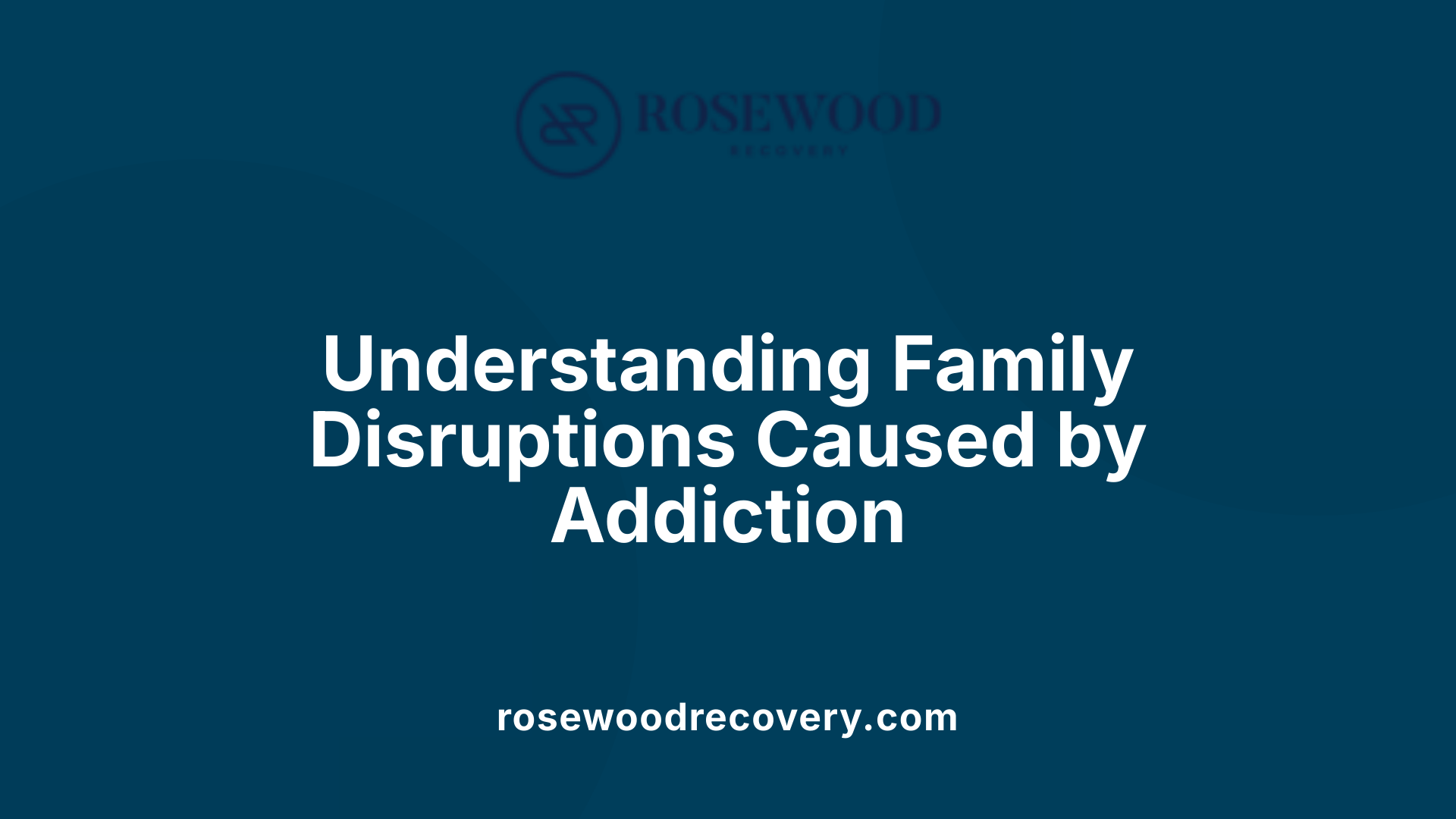
Emotional Trauma Within Families
Addiction doesn't just affect the individual; it casts a long shadow over entire families. Family members often endure deep emotional trauma as they witness loved ones struggle with substance use. This emotional strain can lead to feelings of helplessness, anxiety, and sadness, which, left unaddressed, deteriorate the family’s emotional health.
Trust Erosion Caused by Addiction
One of the most damaging impacts of addiction on families is the erosion of trust. Repeated behaviors associated with substance use can break down trust between family members. This breach affects honest communication and fosters suspicion, which distorts family relationships and creates emotional wounds that take time and dedicated effort to heal.
Changes in Family Roles and Daily Routines
Addiction often alters family dynamics dramatically. Members may adopt specific roles—for example, the “Savior” who tries to rescue the addicted individual, or the “Lost Child” who withdraws to cope. Daily routines, financial stability, and household responsibilities often become disrupted, adding layers of stress and confusion within the family system.
Impact on Communication and Conflict Levels
Communication patterns shift under the strain of addiction, often degrading into avoidance, blame, and conflict. Families may struggle with increased arguments, misunderstandings, and unresolved grievances. These communication breakdowns contribute to dysfunctional family dynamics, hindering recovery efforts.
Children’s Vulnerability in Addicted Families
Children in families affected by substance abuse are especially vulnerable. Approximately one in five children grow up in such environments, facing attachment issues and often assuming inappropriate responsibilities. These challenges can have lasting emotional and psychological effects, underscoring the importance of incorporating family-focused interventions in treatment.
Answer to Covered Question
Addiction deeply disrupts family systems by damaging trust and creating emotional wounds that demand time and healing. Family members experience broken communication lines, heightened conflicts, and shifting roles such as the “Savior” or “Lost Child.” Children endure particular hardships, including attachment difficulties and premature caregiving roles. These multifaceted challenges affirm the necessity for comprehensive treatment services that address both the individual and family to foster recovery and restore healthy dynamics.
The Role of Family Therapy in Rebuilding Trust
Providing Safe Environments for Emotional Expression
Family therapy creates a neutral, supportive space where all members can openly share their feelings. This environment encourages honesty and vulnerability, which are crucial for healing the emotional wounds inflicted by addiction. By facilitating emotional expression, therapy helps families confront difficult truths and begin the process of repairing damaged relationships.
Repairing Communication
Addiction often damages communication patterns, leading to misunderstandings, conflict, and isolation. Family therapy focuses on improving communication skills through techniques like active listening, using 'I' statements, and reflective listening. These methods foster empathy and mutual understanding, enabling family members to rebuild a foundation of trust.
Identifying and Changing Enabling Behaviors
A critical aspect of therapy involves helping families recognize enabling behaviors that may inadvertently support substance use. Therapy guides families to change these patterns by encouraging accountability and supportive yet firm interactions. This shift helps break unhealthy dynamics like codependency and promotes recovery for the addicted individual.
Setting Healthy Boundaries
Establishing clear, realistic boundaries is essential for maintaining emotional safety and supporting sobriety. Therapy assists families in defining these limits to prevent enabling behaviors, reduce conflict, and promote individual growth. Boundaries provide structure for rebuilding trust and help all members feel respected and protected.
Education on Addiction and Relapse Prevention
Family therapy includes educating loved ones about addiction as a complex medical condition influenced by biological, psychological, and environmental factors. This understanding reduces stigma and promotes patience during recovery. Additionally, families learn about relapse triggers and strategies for relapse prevention, empowering them to support long-term sobriety effectively.
What Types of Therapies Are Most Effective in Treating Addiction and Mental Health Problems?
Among various treatments, family therapy stands out as a powerful, evidence-based approach. It facilitates open, honest communication and emotional healing in a neutral setting. This therapy helps families recognize enabling behaviors, establish healthy boundaries, and gain a deeper understanding of addiction. It also fosters empathy and mutual support, which are vital for relapse prevention and sustained recovery.
Integrating Family Therapy within Comprehensive Addiction Treatment
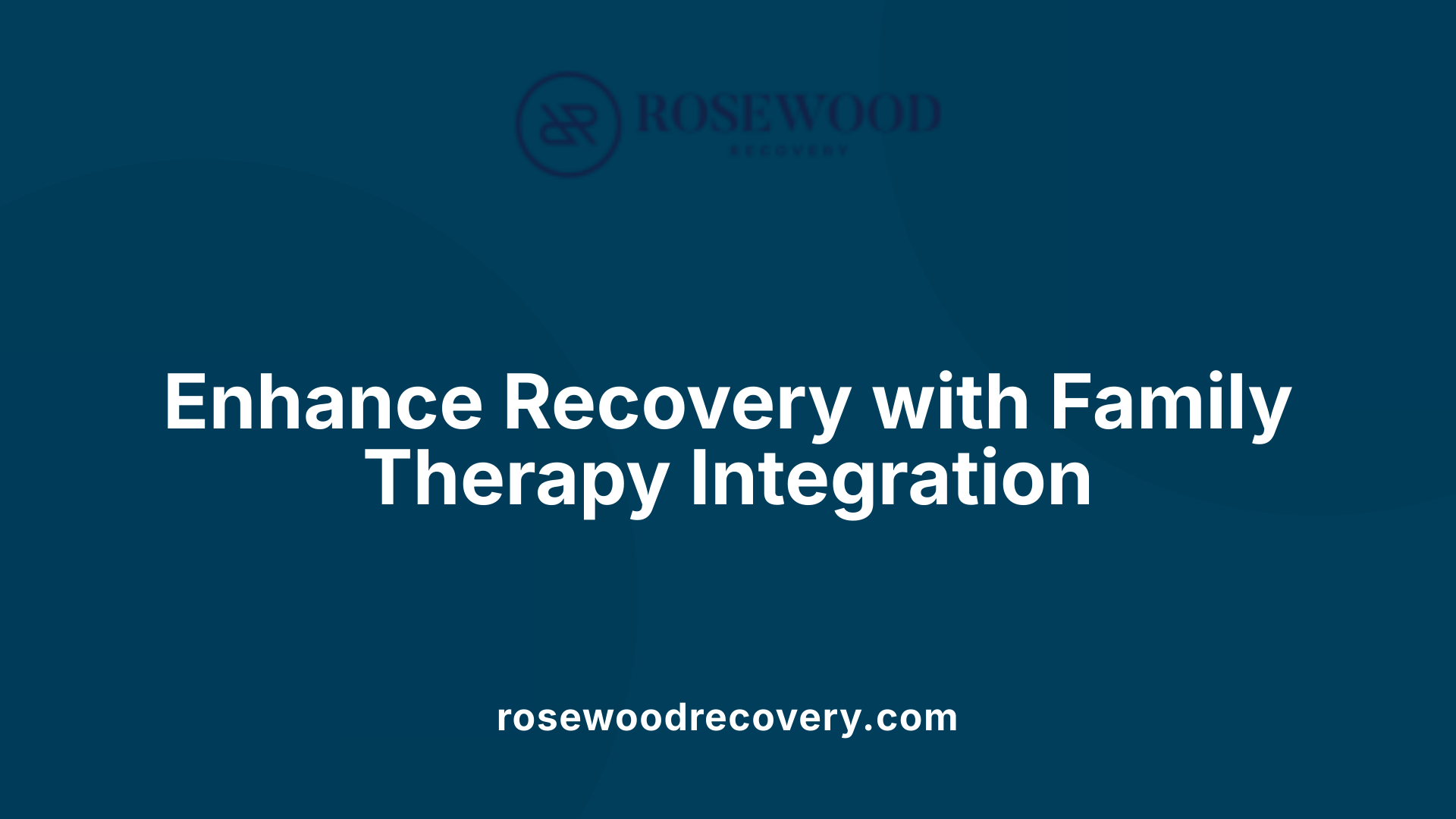
Comprehensive Treatment Components
Addiction treatment often involves several components, including detoxification, residential inpatient care, outpatient services, and targeted specialty programs tailored to specific substance dependencies. Family therapy is a crucial element, woven into these various stages to support healing beyond the individual.
Integration with Outpatient and Intensive Outpatient Programs
Family therapy is effectively incorporated within treatment programs such as Intensive Outpatient Programs (IOP), Outpatient Programs, and Day Treatment Programs. These settings provide a flexible environment where families can actively participate, promoting sustained engagement and joint recovery efforts.
Therapeutic Approaches Used
A blend of evidence-based therapeutic techniques is employed during family therapy sessions. Cognitive Behavioral Therapy (CBT) helps families identify and change unhelpful thought and behavior patterns. Acceptance and Commitment Therapy (ACT) supports emotional acceptance and value-driven action. Motivational Interviewing fosters motivation and commitment to change. Multidimensional Family Therapy (MDFT) targets both adolescents and the family system for holistic recovery.
Personalized Treatment Plans Addressing Co-Occurring Disorders
Providers tailor addiction services through comprehensive assessments that consider addiction severity, mental and physical health, family dynamics, and personal circumstances. This customization integrates family therapy with individual counseling and medical care to address co-occurring disorders, ensuring a flexible and holistic approach.
How Do Treatment Providers Tailor Addiction Services to Address Individual Patient Needs?
Treatment providers begin with thorough evaluations to understand each individual’s unique challenges and strengths. Based on these insights, they integrate family therapy into broader treatment plans, adapting therapeutic methods to the specific needs of patients and their families. This individualized approach fosters healing on multiple levels and strengthens long-term recovery outcomes.
Addressing Co-Occurring Mental Health Disorders in Family-Centered Care
How do treatment programs address both substance abuse and co-occurring mental health disorders simultaneously?
Effective treatment programs use integrated treatment models that simultaneously address addiction and mental health disorders. These programs develop individualized, stage-wise care plans tailored to the unique needs of each person and their family. For example, early stages of care focus on stabilization and detoxification while later stages emphasize relapse prevention and emotional healing.
Coordination is central to this approach, blending psychosocial therapies such as Cognitive Behavioral Therapy (CBT) and Acceptance and Commitment Therapy (ACT) with medication management when appropriate. Family therapy and education are core components, helping loved ones understand the complexity of co-occurring disorders and actively participate in treatment.
What role do staff training and community partnerships play in integrated care?
Well-trained clinicians and support staff are vital in delivering these complex services. Ongoing training ensures they can recognize and treat the interplay between mental health and addiction effectively. Community partnerships with mental health agencies, support groups like Al-Anon, and specialty programs facilitate continuity of care and broaden support networks for families.
Such collaboration helps create recovery capital—networks and resources crucial for sustained sobriety and emotional healing within the family system. This approach also encourages breaking down barriers like denial and shame that often hinder recovery in families facing dual diagnoses.
How is stage-wise care structured to maximize outcomes?
| Stage of Care | Focus Area | Family Involvement |
|---|---|---|
| Early Stage (Detox & Stabilization) | Manage withdrawal, ensure safety | Family education on addiction effects and supports |
| Middle Stage (Therapy & Rehabilitation) | Psychosocial therapy, rebuilding trust, relapse prevention | Family therapy to improve communication and boundaries |
| Later Stage (Aftercare & Maintenance) | Ongoing support, relapse prevention, rebuilding roles | Alumni programs, continued family support groups |
This framework ensures that families receive guidance and tools at each recovery phase, fostering stronger communication, healthier dynamics, and resilience against relapse.
In sum, integrated treatment for co-occurring disorders hinges on coordinated therapies, stage-wise planning, skilled professionals, and community engagement. These elements work together to support both individuals and their families on a path to lasting recovery and restored trust.
Essential Strategies for Rebuilding Trust Post-Addiction
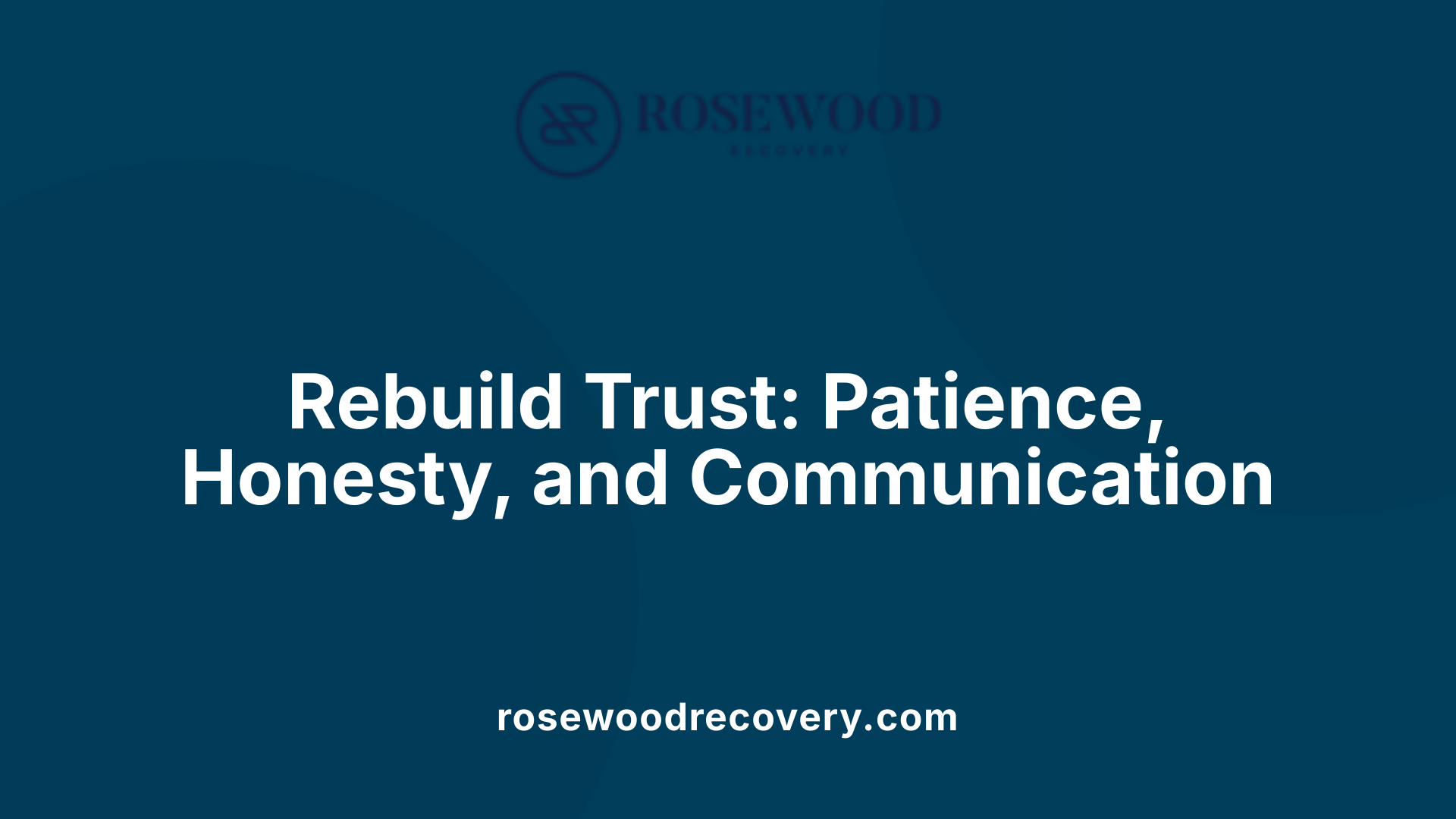
Importance of Patience and Consistency
Rebuilding trust after addiction is a gradual process that demands patience and consistent effort. Trust does not instantly restore but develops through ongoing, positive actions that demonstrate reliability and respect for family members' feelings.
Transparent and Honest Communication
Open and honest conversations are foundational to repairing damaged relationships. Transparent communication means sharing thoughts and feelings without concealment, which helps reduce misunderstandings and reassures family members of commitment to recovery.
Active Listening and Respectful Dialogue
Engaging in active listening encourages empathy and validates each person's experience. Using respectful dialogue techniques such as 'I' statements minimizes blame and promotes a supportive environment for healing.
Setting and Maintaining Healthy Boundaries
Healthy boundaries are crucial to prevent enabling behaviors and protect emotional safety. Families must clearly define and uphold limits that support sobriety and encourage personal growth. This might include rules around substance exposure, communication norms, and personal space.
Replacing Unhealthy Dynamics with Supportive Interactions
Addiction often creates dysfunctional patterns like codependency or enabling. Family therapy helps identify and dismantle these, promoting healthier ways to relate, such as cooperation, mutual respect, and shared accountability. These changes facilitate stronger emotional connections and sustainable recovery.
Answer to Highlighted Question
Rebuilding trust requires a systematic and multifaceted approach incorporating transparent communication, patience, and consistent positive actions over time. Active listening and 'I' statements help foster mutual understanding. Setting boundaries prevents enabling behaviors and protects all family members' well-being. Family therapy helps replace dysfunctional patterns, such as codependency, with healthy interactions that rebuild emotional connections.
Supporting Families: Aftercare and Long-Term Recovery
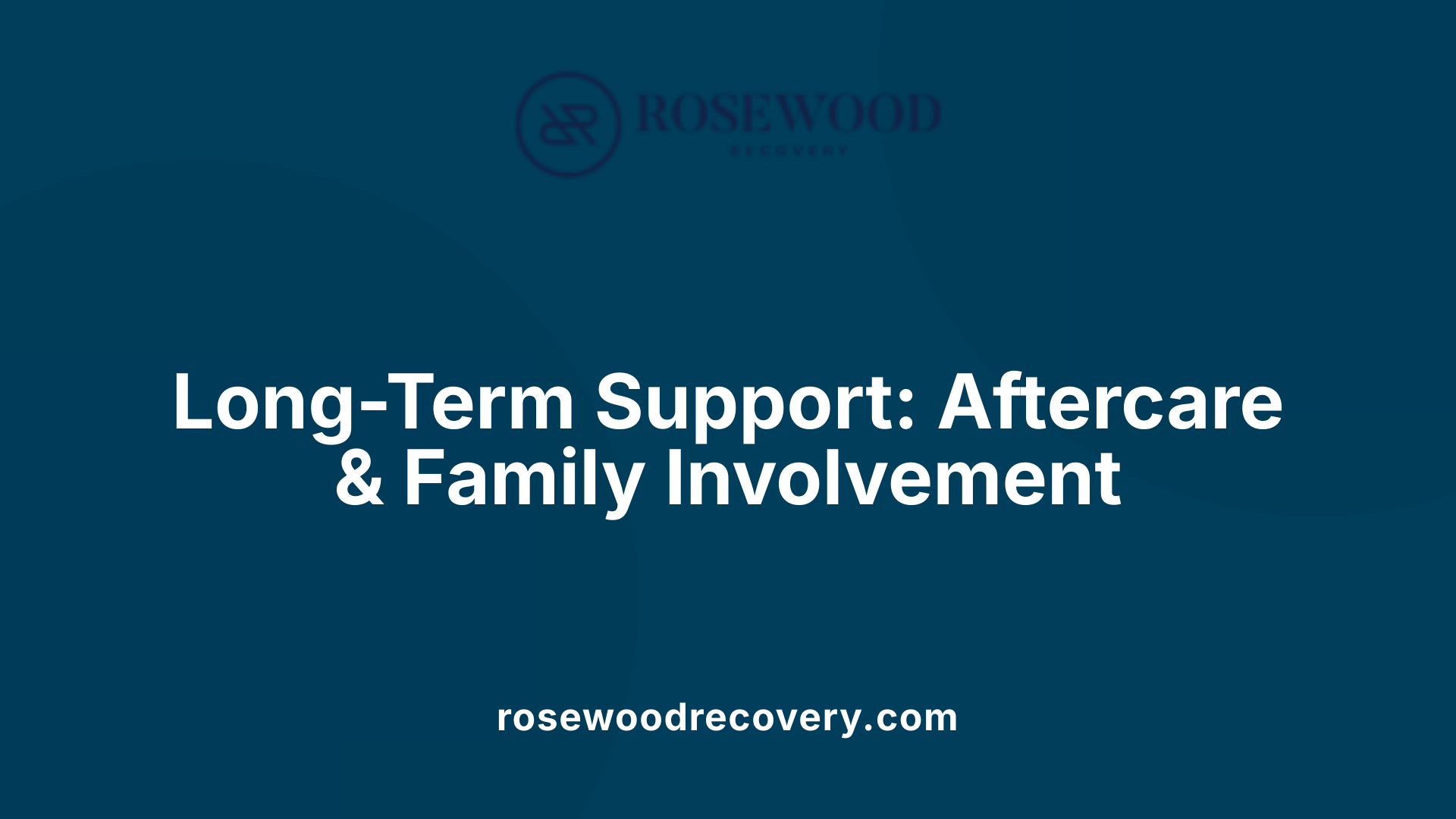
What role does aftercare and ongoing support play in long-term recovery from addiction and mental health disorders?
Aftercare and ongoing support are essential to maintaining long-term recovery from addiction, impacting both the individual and their family. These services help sustain sobriety, manage emotional stress, and prevent relapse by providing structured environments where families can continue healing and growing together.
Support groups like Al-Anon and Nar-Anon play a crucial role by offering family members a space to share experiences and develop coping strategies. These groups foster understanding, reduce feelings of isolation, and promote emotional well-being, empowering families to support their loved ones effectively.
Relapse prevention is enhanced when families participate actively in planning and implementing strategies. Family involvement creates a strong support network, also known as recovery capital, which includes emotional support, healthy communication, and a shared commitment to sobriety.
Alumni programs and continuing family resources offer ongoing education, therapy opportunities, and social connections that reinforce progress made during initial treatment. These programs encourage families to maintain healthy boundaries, address evolving challenges, and celebrate milestones, all critical for rebuilding trust and lasting recovery.
Together, these aftercare components create a comprehensive support system that strengthens family bonds, enhances resilience, and promotes sustained wellness long after initial treatment ends.
Building Recovery Capital Through Family Involvement
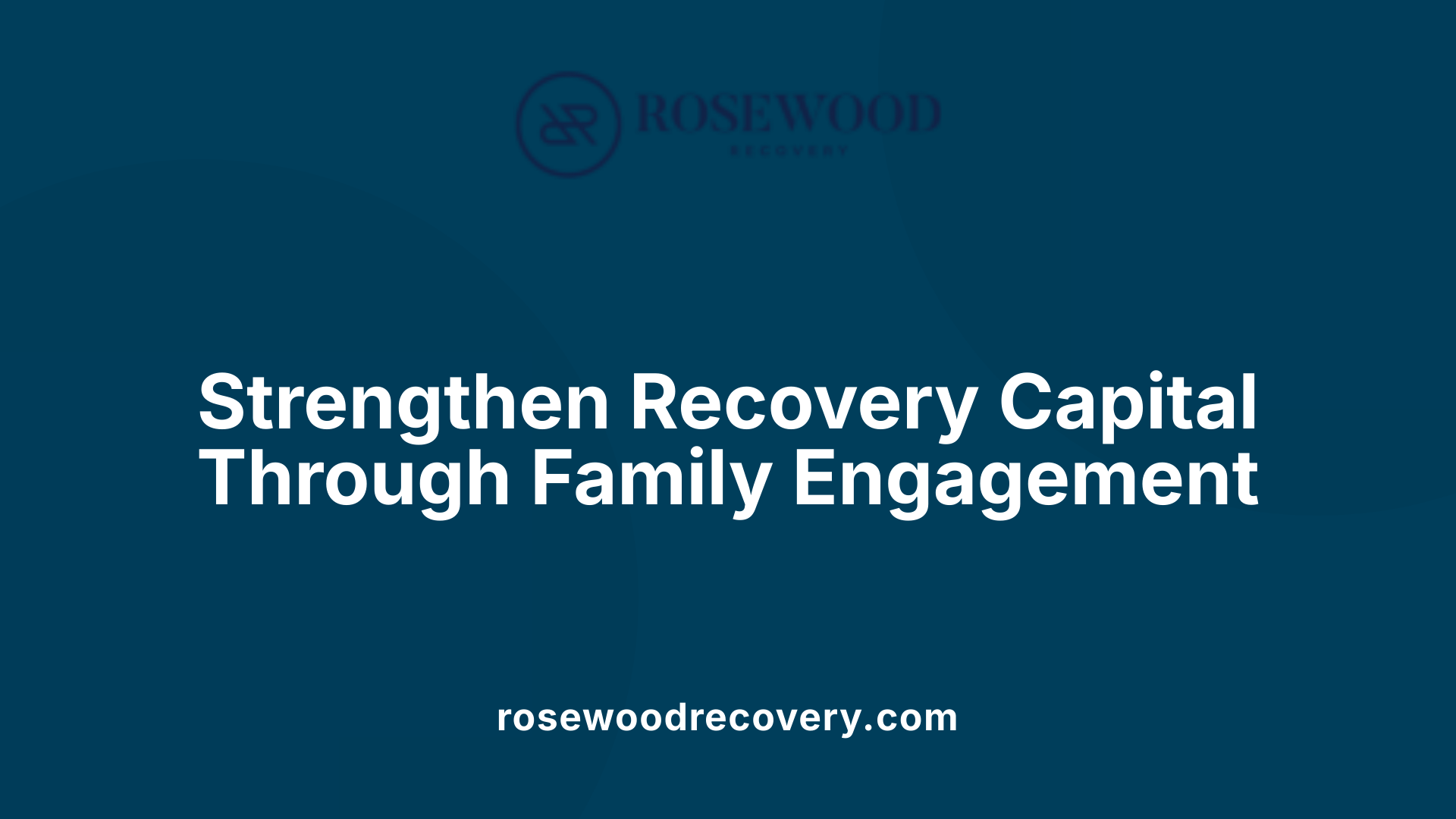
What is Recovery Capital and Why Is It Important?
Recovery capital refers to the internal and external resources that individuals draw upon to initiate and sustain recovery from addiction. These resources include social support, emotional resilience, community engagement, and positive relationships. Strong recovery capital is vital because it provides the foundation for lasting sobriety and mental health stability.
How Do Family Networks and Social Support Contribute?
Families are central to recovery capital. When family members actively participate in treatment and aftercare, they create a supportive environment that encourages honesty, accountability, and emotional healing. Multigenerational relationships and coordinated co-parenting add layers of stability that protect against relapse and promote trust.
Why Is Engagement in Community and Activities Beneficial?
Involvement in community activities expands social support networks beyond the family, offering new connections and purpose. Engaging in group events, volunteering, or therapy groups builds a sense of belonging that strengthens motivation and reduces isolation—a common relapse trigger.
How Does Strengthening Relationships Support Sobriety?
Ongoing efforts to improve family communication, set healthy boundaries, and celebrate recovery milestones nurture emotional safety. Open discussions about challenges and progress allow family members to understand each other better and respond with empathy, reinforcing mutual commitment to recovery.
Combining these elements creates a robust safety net that supports individuals through the complexities of long-term recovery.
Aftercare and Ongoing Support in Long-Term Recovery
Family involvement builds essential recovery capital—social networks, emotional resources, and community connections—that bolster sustained wellness. Establishing healthy routines, engaging in community activities, and fostering open discussions about progress and challenges fortify resilience and provide stability. Multigenerational support and cooperative co-parenting further reduce relapse risk and improve long-term outcomes by enhancing emotional safety.
Practical Steps for Families: Starting and Sustaining Therapy
Identifying Goals for Therapy
Starting family therapy requires setting clear, specific goals that address the unique challenges your family faces due to addiction. These goals might include improving communication, rebuilding trust, understanding addiction, and learning how to support relapse prevention. Having well-defined objectives helps guide therapy sessions and measures progress over time.
Researching and Selecting Licensed Therapists
Finding a licensed therapist experienced in addiction and family dynamics is essential. Look for professionals skilled in evidence-based approaches like Cognitive Behavioral Therapy (CBT), Motivational Interviewing, or Multidimensional Family Therapy (MDFT). Research local treatment centers or ask for recommendations to ensure you select someone who understands complex family issues related to addiction.
Commitment to Regular Participation
Consistent attendance is crucial for therapy effectiveness. The process of healing and rebuilding family relationships takes time, often several months. Committing to regular sessions strengthens emotional bonds, fosters accountability, and supports gradual progress toward recovery and trust rebuilding.
Balancing Joint and Individual Sessions
Therapy often involves both joint family sessions and individual meetings. Individual sessions allow family members to process personal emotions, while joint sessions focus on improving collective communication and problem-solving skills. Balancing both formats ensures comprehensive healing for each member and the family unit as a whole.
Developing Coping and Communication Skills
Therapy equips families with practical tools such as active listening, 'I' statements, setting healthy boundaries, and conflict resolution strategies. These skills help replace unhealthy patterns like enabling or codependency with supportive, respectful interactions. Mastering these techniques creates a safe family environment that encourages empathy and sustained recovery.
In summary, beginning family therapy after addiction recovery involves setting clear family goals, finding a trusted therapist, maintaining regular sessions, balancing individual and joint meetings, and focusing on developing healthy communication and coping skills. This structured approach supports emotional healing and strengthens family bonds vital for long-term sobriety.
Moving Forward Together: Healing Takes Time and Commitment
Rebuilding trust with family after addiction is a challenging but achievable journey grounded in patience, transparency, and mutual support. Family therapy and comprehensive treatment services provide the tools and safe spaces needed to address emotional wounds and foster healthy communication. When combined with ongoing aftercare, relapse prevention, and supportive networks, families can transform dysfunction into cohesion, paving the way for lasting recovery and renewed hope. Healing is a gradual process, but with dedication and professional guidance, families can restore trust and emerge stronger together.
References
- Family Therapy: Rebuilding Trust After Addiction
- Family Afterward: Rebuilding Trust & Relationships in ...
- Rebuilding Family Bonds Through Addiction Recovery
- Family Therapy Repairs Relationships and Strengthens ...
- Family Therapy: Strengthening Bonds and Supporting ...
- Family Dynamics in Early Recovery
- Find treatment for substance use | Behavioral Health Services
- Integrated Treatment for Co-Occurring Disorders
- Availability and Correlates of Integrated Treatment for ...

.jpeg)
.jpeg)

